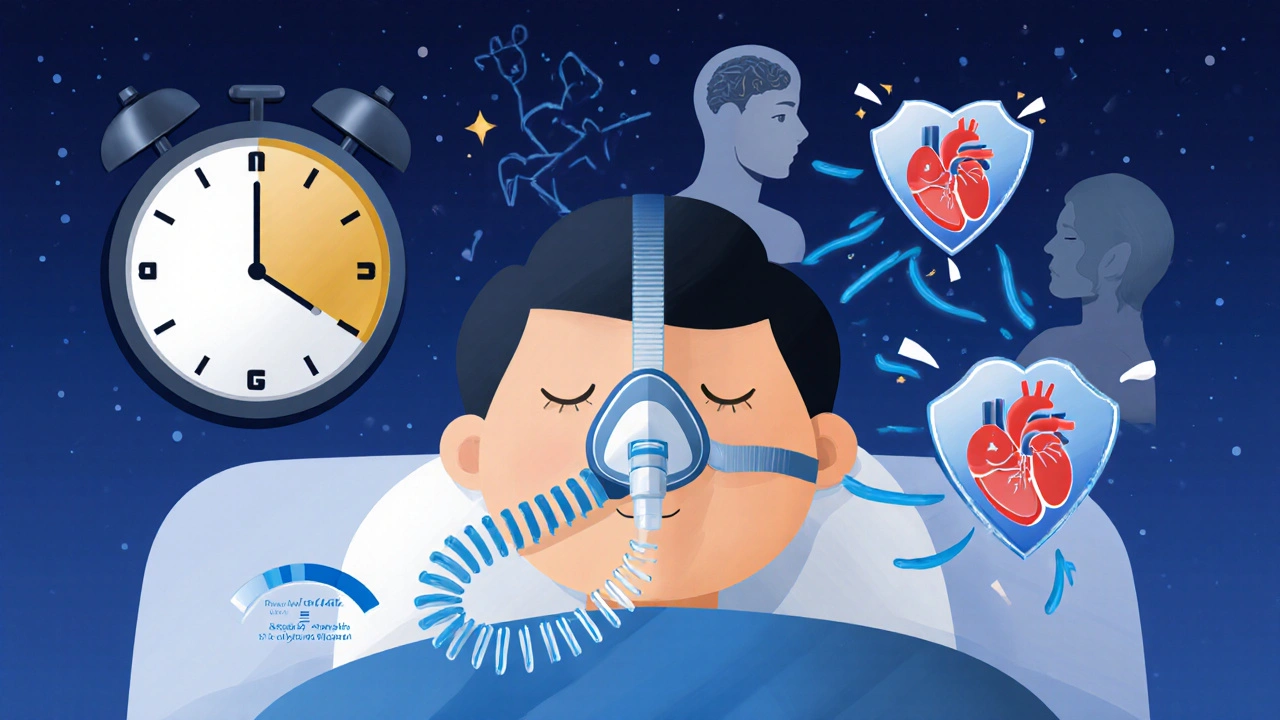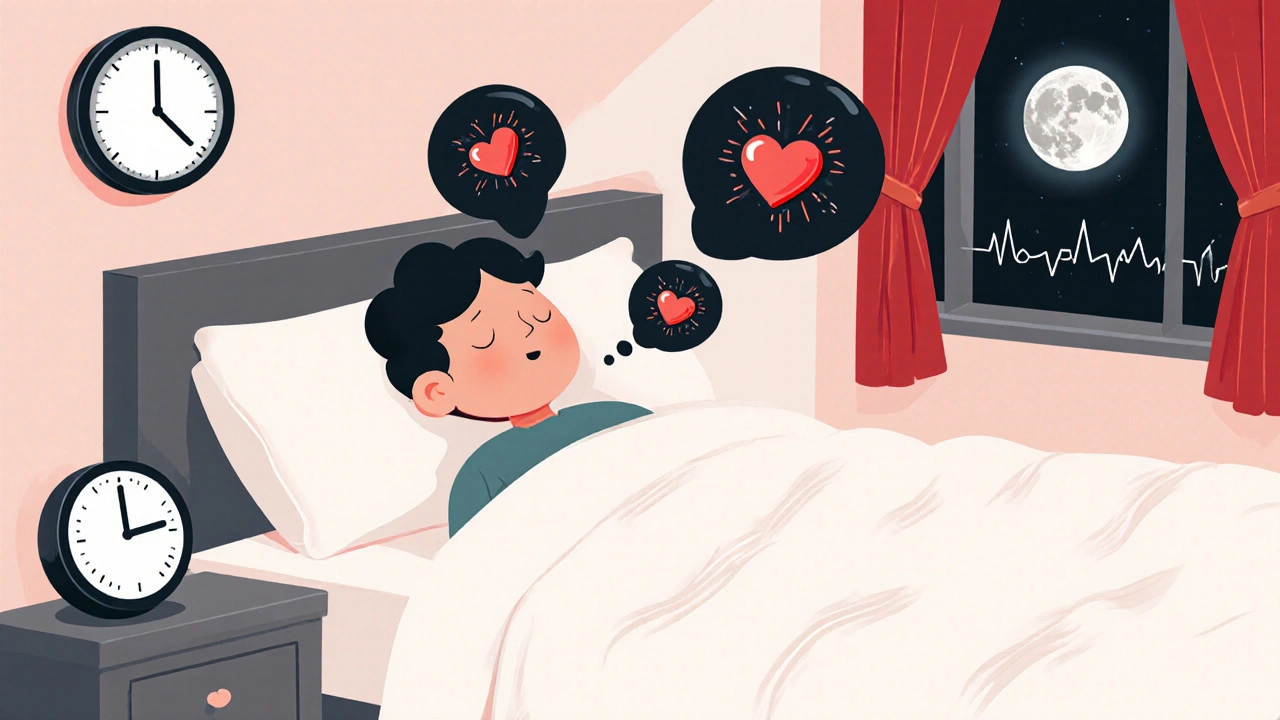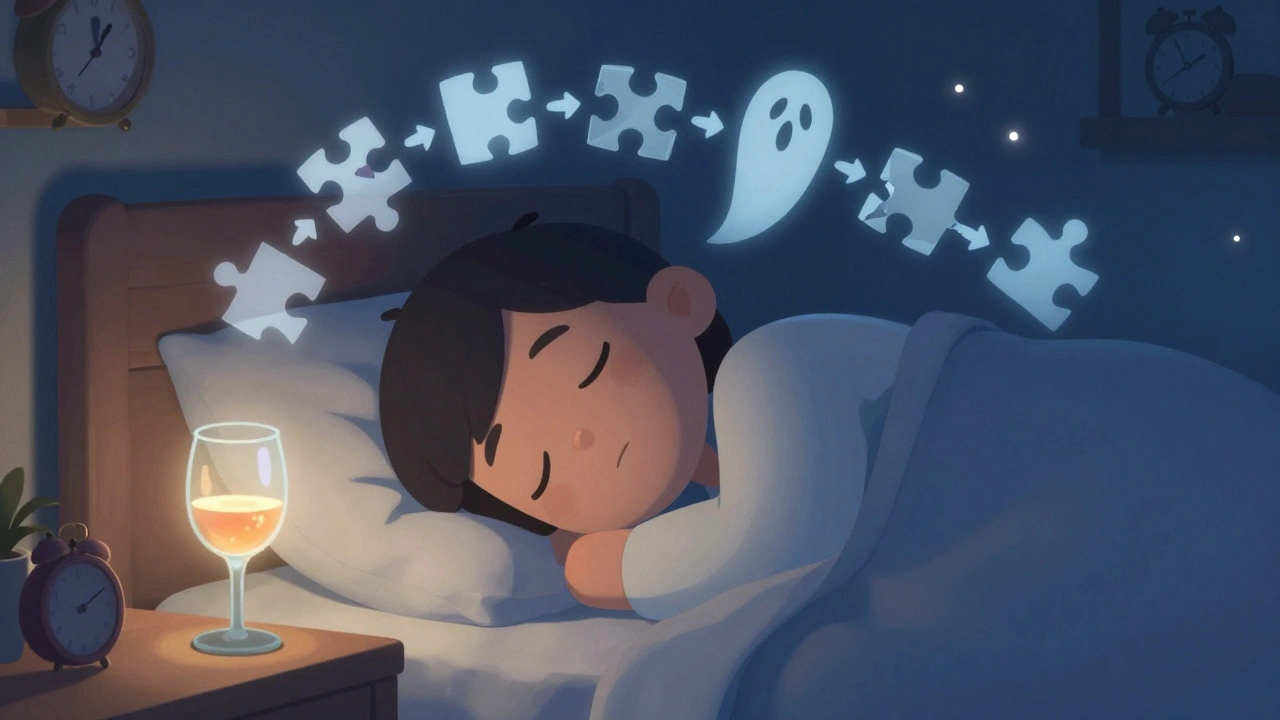Why Your Sleep Apnea Might Be Hurting Your Heart
If you snore loudly, wake up gasping, or feel exhausted even after a full night’s sleep, you might have sleep apnea. It’s not just annoying-it’s dangerous. About 1 billion people worldwide have it, and nearly 80% of them don’t even know it. What most people don’t realize is that sleep apnea isn’t just a breathing problem. It’s a silent driver of high blood pressure, heart attacks, strokes, and heart failure. The connection is strong, direct, and backed by decades of research.
How Sleep Apnea Breaks Down Your Cardiovascular System
When you have obstructive sleep apnea (OSA), your airway collapses during sleep. You stop breathing for 10 seconds or longer, sometimes hundreds of times a night. Each time, your oxygen drops. Your brain panics, jolts you awake just enough to breathe again-and then you fall back asleep, unaware. This cycle doesn’t just mess with your sleep. It throws your entire cardiovascular system into chaos.
Every time you stop breathing, your body floods with stress hormones. Catecholamine levels spike 2 to 4 times higher than normal during sleep. Your heart rate jumps. Your blood pressure spikes. Your blood vessels constrict. These aren’t minor blips. They’re repeated assaults on your heart and arteries. Over years, this constant strain wears down your system. The result? Higher risk of hypertension, coronary artery disease, and arrhythmias.
High Blood Pressure: The Most Common Link
Up to 80% of people with resistant hypertension-high blood pressure that won’t budge even after taking three different medications-have undiagnosed sleep apnea. That’s not a coincidence. Sleep apnea doesn’t just raise blood pressure at night. It rewires your body’s long-term control system. About 70-80% of people with OSA don’t experience the normal nighttime dip in blood pressure. Instead, their pressure stays high or even rises. This is called non-dipping, and it’s one of the strongest predictors of heart attack and stroke.
Studies show that people with moderate to severe sleep apnea are two to three times more likely to develop high blood pressure within just four to five years. And it’s not just older adults. Younger people with sleep apnea (ages 20-40) are 45% more likely to have hypertension than their peers without it. That’s a bigger jump than in older groups, suggesting sleep apnea may be accelerating heart disease in younger populations.
Heart Disease and Heart Attacks: A Hidden Trigger
Obstructive sleep apnea increases your risk of coronary artery disease by 30%. If you have moderate to severe OSA (an AHI of 15 or higher), your chance of having a heart attack goes up by 30%, and your risk of a fatal heart event jumps 60%. What’s even more startling? About 26.5% of heart attacks in people with sleep apnea happen between midnight and 6 a.m.-a time when the body should be resting. In people without sleep apnea, only 16.5% of heart attacks occur then.
This isn’t random. The repeated drops in oxygen, surges in blood pressure, and stress on the heart create the perfect storm for plaque rupture and clot formation. The heart is already working harder, and when it’s forced to pump against higher resistance during apnea episodes, the demand for oxygen skyrockets. Meanwhile, oxygen supply is dropping. That mismatch is what triggers heart damage.
Stroke Risk Skyrockets
People with sleep apnea are 2.5 times more likely to have a first stroke. If you’ve already had one, your risk of having another jumps to 3.2 times higher. The worse your nighttime oxygen levels drop-especially if your blood oxygen stays below 90% for more than 12% of the night-the higher your risk of dying from a stroke. One study found that this level of hypoxia was linked to a 4.3 times higher stroke mortality rate.
Why? The same mechanisms that damage the heart also attack the brain. Chronic low oxygen causes inflammation, damages blood vessel linings, and promotes blood clotting. Your brain’s blood supply becomes unstable. Even mild sleep apnea increases stroke risk, which is why doctors now recommend screening for sleep apnea in every stroke patient.
Heart Failure and Arrhythmias: A Dangerous Cycle
Between 40% and 60% of people with heart failure also have sleep apnea. And it’s not just a side effect-OSA makes heart failure worse. Having sleep apnea increases your risk of developing heart failure by 140%. Once you have both, the two conditions feed off each other. The heart struggles to pump. The lungs struggle to oxygenate. The body’s stress response keeps firing. It’s a downward spiral.
Arrhythmias, especially atrial fibrillation (AFib), are also tightly linked. People with sleep apnea are two to four times more likely to develop AFib. In one study, 49% of patients with paroxysmal AFib had sleep apnea, compared to just 21% of those without it. Even more concerning: if you have AFib and untreated sleep apnea, your chances of successful catheter ablation drop by 30%. Your heart rhythm therapy won’t work as well if your sleep apnea is still active.
Why CPAP Isn’t a Magic Fix-But It Still Matters
Continuous Positive Airway Pressure (CPAP) is the most common treatment. It keeps your airway open with gentle air pressure. But here’s the truth: CPAP doesn’t always lower blood pressure dramatically. On average, it reduces systolic pressure by just 2-3 mmHg. That sounds small. But that’s not the whole story.
CPAP cuts stroke recurrence by 37%. It improves heart failure outcomes, especially in cases of central sleep apnea. It boosts the success rate of AFib treatments. It reduces inflammation and improves endothelial function over time. The problem isn’t that CPAP doesn’t work-it’s that most people don’t use it enough. Only 46% of users stick with it for at least four hours a night, seven nights a week. Without consistent use, the cardiovascular benefits vanish.
And not everyone tolerates CPAP. That’s why alternatives like oral appliances, weight loss, positional therapy, and newer nerve-stimulating devices are gaining ground. The goal isn’t perfection-it’s consistency. Even 3-4 hours of nightly use can make a measurable difference in long-term heart health.

Who Should Be Screened-and How
Cardiologists now agree: if you have high blood pressure, atrial fibrillation, heart failure, coronary artery disease, or a history of stroke, you should be screened for sleep apnea. Especially if your condition is hard to control. The STOP-Bang questionnaire is a simple, fast tool used in clinics. It asks about snoring, tiredness, observed apneas, high blood pressure, BMI, age, neck size, and gender. It’s 84% sensitive for moderate to severe sleep apnea.
Home sleep tests are accurate for moderate to severe cases (85-90% sensitivity), but they often miss mild ones. Polysomnography-the full overnight sleep study-is still the gold standard, but access is limited. If you have symptoms and a known heart condition, don’t wait for a perfect test. Start the conversation with your doctor.
The Bigger Picture: Sleep Apnea Is a Public Health Crisis
The obesity epidemic is pushing sleep apnea rates up by 5% every year. One in five adults now has moderate to severe sleep apnea. Yet, most remain undiagnosed. And because it’s invisible, it’s ignored. But it’s not harmless. It’s a major, under-treated cardiovascular risk factor-on par with smoking, diabetes, and high cholesterol.
The solution isn’t just better machines. It’s better awareness. It’s cardiologists and sleep specialists working together. It’s screening patients before they have a heart attack or stroke. It’s treating sleep apnea not as a side issue, but as a core part of heart care.
What You Can Do Right Now
- If you snore loudly and feel tired during the day, ask your doctor about sleep apnea.
- If you have high blood pressure that won’t go down, get tested-even if you’re young.
- If you’ve had a heart attack, stroke, or AFib, request a sleep evaluation.
- If you’re on CPAP, aim for at least 4 hours a night, 5 nights a week. Track your usage.
- Weight loss is one of the most effective treatments. Losing just 10% of your body weight can cut apnea severity in half.
Sleep apnea isn’t just about poor sleep. It’s about your heart’s future. Ignoring it is like ignoring your cholesterol. The damage is silent. The consequences aren’t.
Can sleep apnea cause high blood pressure even if I’m young?
Yes. Studies show adults under 40 with sleep apnea are 45% more likely to develop high blood pressure than their peers without it. The stress on the cardiovascular system from repeated oxygen drops and adrenaline surges can trigger hypertension years earlier than usual. This makes sleep apnea a key risk factor even in younger, otherwise healthy people.
Is CPAP the only treatment for sleep apnea?
No. While CPAP is the most common and effective treatment for moderate to severe obstructive sleep apnea, alternatives exist. Oral appliances that reposition the jaw work well for mild to moderate cases. Weight loss can dramatically reduce or even eliminate symptoms. Positional therapy (sleeping on your side) helps if apnea only happens when you’re on your back. Newer devices like hypoglossal nerve stimulators are also approved for certain patients who can’t tolerate CPAP.
Does treating sleep apnea reduce the risk of heart attack?
Yes, but the benefit comes from consistent, long-term use. While CPAP doesn’t always lower blood pressure dramatically, it reduces inflammation, improves oxygen levels, and stabilizes heart rhythms-all of which lower the risk of heart attacks over time. Studies show it cuts stroke recurrence by 37% and improves survival in heart failure patients. The key is sticking with treatment.
Can I have sleep apnea even if I’m not overweight?
Absolutely. While obesity is the biggest risk factor-accounting for 70% of cases-sleep apnea can affect anyone. Thin people with narrow airways, large tonsils, a recessed jaw, or a family history of apnea are also at risk. Symptoms like loud snoring, daytime fatigue, and waking up gasping matter more than weight alone.
Why does my doctor care if I have sleep apnea after a heart attack?
Because untreated sleep apnea makes recovery harder and increases your chance of another event. It raises blood pressure, triggers arrhythmias, and worsens heart failure. Studies show that people with sleep apnea have lower success rates with procedures like stents and ablation. Treating it improves outcomes, reduces hospital readmissions, and helps medications work better. It’s not optional-it’s part of your heart recovery plan.
Next Steps: Don’t Wait for a Crisis
If you’ve been told you snore, feel tired all day, or have a heart condition that’s not improving, don’t brush it off. Sleep apnea is treatable. The longer it goes ignored, the more damage it does to your heart. Talk to your doctor. Get screened. Start treatment. Your heart will thank you years from now.



Kathy Grant
It’s staggering how something as quiet as disrupted breathing can unravel the entire cardiovascular system. I’ve seen patients in my practice who didn’t even realize they were gasping for air at night-until their ECG showed atrial fibrillation they couldn’t explain. The body doesn’t lie. Those micro-arousals? They’re not just sleep fragments. They’re stress grenades going off in the autonomic nervous system, over and over. And we treat the hypertension like it’s the problem, not the symptom. We’re missing the root.
November 17, 2025 AT 12:51
Jennie Zhu
The data on non-dipping blood pressure patterns in OSA patients is unequivocal. The loss of circadian nocturnal dip is an independent predictor of target organ damage, particularly in the left ventricle and cerebral vasculature. Furthermore, intermittent hypoxia induces oxidative stress via NADPH oxidase upregulation, which directly contributes to endothelial dysfunction and arterial stiffening. CPAP adherence remains the gold standard intervention, with meta-analyses demonstrating significant reductions in inflammatory biomarkers such as CRP and IL-6 with consistent use.
November 18, 2025 AT 18:32
Robert Merril
so cpap lowers bp by 2-3 mmhg??? wow what a miracle cure right??? lol i bet the drug companies love this. you know what really fixes sleep apnea? losing weight. not some noisy mask that makes you look like a robot from a bad 70s movie. and dont even get me started on how they make you pay 2k for it. its all about the money not your heart. also why dont they just tell people to stop sleeping on their back???
November 19, 2025 AT 14:54
Noel Molina Mattinez
Im 32 and snore loud and wake up tired always thought it was just stress now i think its apnea my doc said im not overweight so no need to test but im not buying it. i had a bp spike last month and they didnt even ask about sleep. this is why people die. they ignore the invisible stuff. i dont care what they say about bmi. if you gasp you got it. get tested. dont wait for a heart attack to prove them wrong
November 21, 2025 AT 00:18
Christina Abellar
This is such an important conversation. I’m glad more cardiologists are starting to screen. Sleep isn’t a luxury-it’s foundational medicine. If you’re tired all the time and have heart issues, please, just ask. No shame. No judgment. Just a simple question: Do you snore? Do you wake up choking? That’s all it takes to start saving your heart.
November 21, 2025 AT 21:28
Roberta Colombin
Thank you for writing this with such clarity. I’ve worked with patients from rural communities who never had access to sleep studies. We need simple tools like the STOP-Bang in primary care everywhere. We also need to stop making people feel guilty for being overweight. Sleep apnea is not a moral failure. It’s a medical condition. And treatment should be accessible, not a privilege for those who can afford the most expensive masks or surgeries.
November 23, 2025 AT 13:34
Georgia Green
just had a cpap machine for 6 months. used it 3 hrs a night max. my bp dropped 8 points. not because of the machine alone but because i started tracking my sleep and realized how bad it was. now i sleep on my side and lost 12 lbs. no magic. just awareness. also the mask leaks like crazy. maybe next gen ones will be better
November 23, 2025 AT 13:40
Ashley Unknown
you know what they’re not telling you? the real reason sleep apnea is so widespread isn’t obesity or anatomy-it’s the fluoridated water. fluoride calcifies the pineal gland and messes with your brain’s ability to regulate breathing during sleep. the CDC knows. the AMA knows. they don’t want you to know because then people would stop drinking tap water and start buying bottled water. and who profits from that? the pharmaceutical companies who sell CPAP machines and blood pressure meds. and the water companies. it’s all connected. i’ve read the studies. they buried the truth. you think your snoring is bad? imagine what they’re doing to your brain with the chemicals in your air and water. wake up. it’s not just your heart. it’s your entire nervous system. they’re poisoning us slowly and calling it normal
November 24, 2025 AT 18:43
Dave Feland
Let me be clear: The entire narrative around sleep apnea is a manufactured crisis designed to push CPAP sales and inflate healthcare spending. The 1 billion figure is extrapolated from flawed epidemiological models using BMI thresholds that don't correlate with physiological obstruction. The link to hypertension? Confounded by age, sedentary lifestyle, and metabolic syndrome. The 37% stroke reduction claim? Based on industry-funded trials with selection bias. And yet, we're now screening stroke patients for apnea as if it's a causal agent rather than a comorbidity. This is pseudoscience dressed in medical jargon. The real solution? Stop treating symptoms and start addressing the root cause: chronic inflammation from processed foods and sedentary living. CPAP is a Band-Aid on a bullet wound.
November 25, 2025 AT 20:55